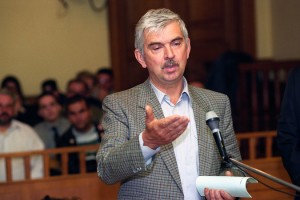Intent on Unsettling E.U., Russia Taps Foot Soldiers From the Fringe
< < Go Back
To his neighbors in a village in western Hungary, 76-year-old Istvan Gyorkos was just an old man who mostly kept to himself. Hardly anyone looked askance at his passion for guns and for training youths in paramilitary tactics.
In late October, however, Mr. Gyorkos, a veteran neo-Nazi and the leader of a tiny fringe outfit called the Hungarian National Front, suddenly took on a more sinister visage when, according to Hungarian police officers who raided his home in search of illegal weapons, he shot and killed a member of the police team with an assault rifle. Members of his family say the dead policeman was shot by a fellow officer.
The saga then took an even stranger turn: Hungarian intelligence officials told a parliamentary committee in Budapest that Mr. Gyorkos had for years been under scrutiny for his role in a network of extremists linked to and encouraged by Russia. So close was the relationship, the committee heard, that Russian military intelligence officers, masquerading as diplomats, staged regular mock combat exercises using plastic guns with neo-Nazi activists near Mr. Gyorkos’s home.
That Russia, a nation intensely proud of its huge role in the defeat of Hitler’s Germany in World War II, would want anything to do with marginal, anti-Semitic crackpots who revere Hitler’s wartime allies in Hungary might, at first glance, seem beyond comprehension.
But Andras Racz, a Russia expert at the Finnish Institute of International Affairs, said it fit into a scattershot strategy of placing small bets, directly or through proxies, on ready-made fringe groups in an effort to destabilize or simply disorient the European Union.
Most of these bets fail, but reaching out to those on the margins costs little and sometimes hits pay dirt. That happened with Jobbik, a once-marginal far-right Hungarian group that is now the country’s leading opposition party — and a big fan of President Vladimir V. Putin, as is Hungary’s prime minister, Victor Orban.
At a time when Russia’s relations with the West, or at least with established parties there, have soured dramatically over Syria, Ukraine and accusations of interference on all sides, Mr. Putin has enjoyed an extraordinary run of apparent good luck, as exemplified by the surprise election victory of Donald J. Trump, who has repeatedly voiced admiration for the Russian leader. Pro-Russia candidates won presidential elections recently in Bulgaria and Moldova, and France’s National Front, which received bank loans worth nearly $12 million from Russian banks, is now a serious contender for the French presidency next year.
Britain, which has generally taken a tough stance on Russia and its meddling abroad, has turned in on itself amid rancorous internal struggles over how to leave the European Union after a referendum in June.
Even in Estonia, a Baltic nation deeply suspicious of Moscow, a party long reviled as a Russian tool recently took charge of a new government.
Each country has its own particular and often very local reasons for its Russia-friendly turn. Mr. Putin did not engineer the shift single-handedly, but he has been adept at making his own luck, deploying Orthodox priests, Russian-funded news media outlets like RT, spies and computer hackers to ride and help create the wave of populist anger now battering the foundations of the post-1945 European order.
More From The New York Times:





